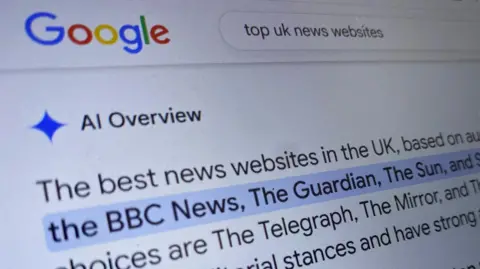Publishers Confront AI Summaries Impacting Online Traffic
Business and finance reporter covering corporate news, markets, and economic trends

In the evolving digital landscape, publishers are facing a new challenge as AI-generated summaries from Google begin to impact online traffic. This shift raises significant concerns about the future of digital news consumption and the financial viability of online media.
As the digital age progresses, publishers are increasingly dependent on online traffic to sustain their operations. The recent introduction of AI summaries by Google, featured prominently in search results, has raised alarms among media houses. These summaries, known as AI Overviews, provide concise information that often satisfies users' queries without requiring them to click on the original article. This shift has led to a noticeable decrease in traffic to publisher websites, threatening their revenue streams. Dr. Felix Simon from the Reuters Institute highlights the difficulty in quantifying the scale of this impact due to the lack of transparent data from Google.
The consequences of AI Overviews are particularly acute in a market already strained by declining advertising revenues, largely due to competition from social media platforms. David Higgerson, chief digital publisher at Reach, emphasizes the unfairness of the situation, where publishers create valuable content that fuels Google's ecosystem, yet receive little in return when users are satisfied with AI summaries. The introduction of Google's 'AI Mode,' which presents search results in a conversational style with fewer links, could further exacerbate the problem if widely adopted.
Despite the challenges, not all publishers have experienced a decline in traffic. Stuart Forrest of Bauer Media notes that while their brands such as Grazia and Empire haven't seen a drop, the potential for future impact remains a concern. The industry is on high alert, anticipating changes in user behavior as they become accustomed to these AI-driven panels. Google's response has been to assert that their search engine continues to drive significant traffic to websites, with claims of stable click volumes and improved quality of engagement.
In response to these challenges, some publishers are seeking legal pathways to address the issue. A coalition including the Independent Publishers Alliance and other advocacy groups has filed a complaint with the UK's Competition and Markets Authority, urging them to intervene and prevent Google from leveraging publisher content without fair compensation. Meanwhile, media companies are exploring strategies to optimize their presence in AI summaries. This involves trial and error in content presentation to ensure they remain visible and relevant in these AI-driven contexts.
Publishers are also diversifying their approaches to audience engagement. Reach, for instance, is investing in direct communication channels such as WhatsApp alerts and newsletters to maintain a connection with their audience. By offering tailored content and fostering direct relationships, publishers aim to reduce reliance on third-party platforms like Google for traffic. This strategy underscores the need for innovation and adaptability in the face of technological advancements that reshape the media landscape.
About David Chen
Business and finance reporter covering corporate news, markets, and economic trends